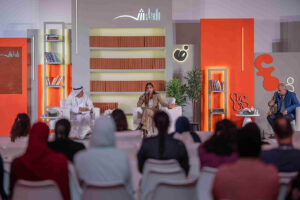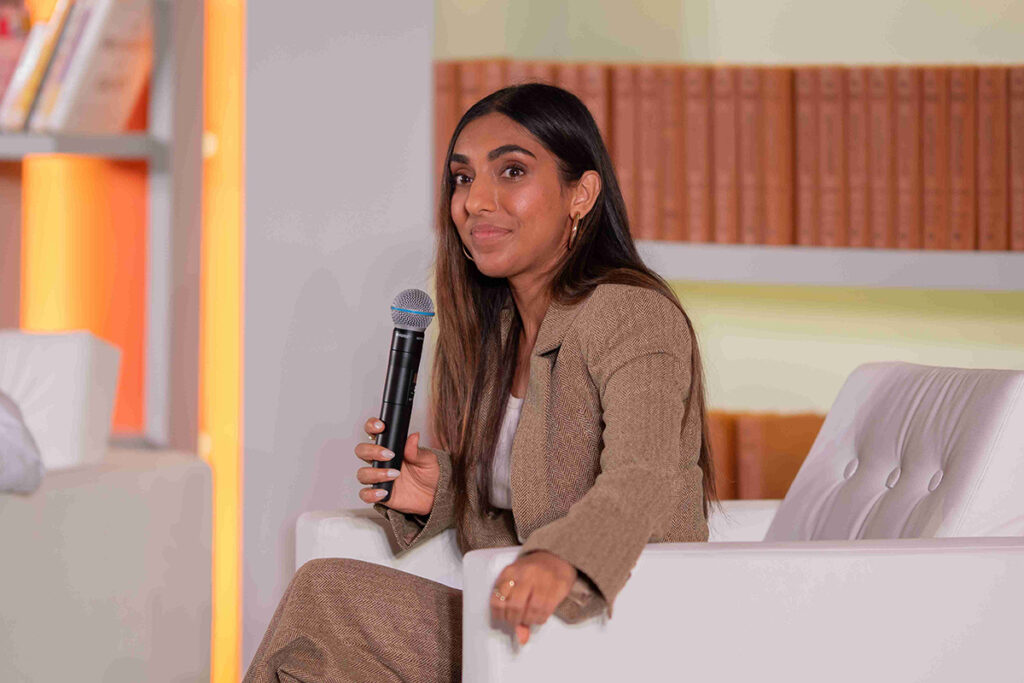 In an inspiring conversation at the ongoing 43rd Sharjah International Book Fair (SIBF), celebrated poet Rupi Kaur shared insights into her creative journey, cultural roots, and the power of poetry to connect and heal. Joined by Emirati poet and moderator Dr. Khalid Al Budoor, Kaur explored how her work has evolved, blending traditional influences with modern performance art to reach millions worldwide.
In an inspiring conversation at the ongoing 43rd Sharjah International Book Fair (SIBF), celebrated poet Rupi Kaur shared insights into her creative journey, cultural roots, and the power of poetry to connect and heal. Joined by Emirati poet and moderator Dr. Khalid Al Budoor, Kaur explored how her work has evolved, blending traditional influences with modern performance art to reach millions worldwide.
Reflecting on her Punjabi heritage, Kaur spoke of her community’s appreciation for poetry across generations, emphasising its accessibility. “In my culture, poetry is for everyone – whether it’s an 80-year-old grandma or a teenager. It’s about making people feel seen,” she said. While her simple, emotionally resonant style sometimes draws criticism in the West, Kaur embraces this fusion, stating, “Poetry is the language of the soul, and everyone should have access to it.”
A journey from visual arts to poetry performance
Kaur initially gravitated towards visual arts, but an open mic in high school introduced her to poetry performance. “Hearing my voice through a microphone was transformative,” she recounted. This sparked her transition to poetry, leading to her minimalist style, which she describes as a “side effect” of her performance-driven approach. Over time, she’s incorporated music, set design, and projection art into her live shows, crafting immersive experiences. “There’s beauty in creating a world on stage and inviting people into it,” she noted.
Empowering voices through accessible poetry
Throughout her career, Kaur has seen poetry as a means to process personal and collective challenges. Writing as a woman from a marginalised background, she feels compelled to amplify underrepresented voices. “Historically, many women couldn’t publish. I want to empower others to use their voices,” she said. Her work invites readers to engage deeply with themes of identity, resilience, and healing, and she strives to make each word impactful. “Every word does heavy lifting. I want my readers to engage emotionally and process their own experiences,” she explained.
Social media and the democratisation of poetry
Often referred to as the “poetess of Instagram,” Kaur credits social media for breaking down barriers in the literary world. Her Instagram platform, with over 4.4 million followers, has allowed her poetry to reach diverse audiences, bypassing traditional publishing gatekeepers. “Without social media, my voice might not have reached this level,” she acknowledged, noting how the platform resonates with readers through simple yet profound messages.
Kaur’s straightforward style has been critiqued as “naive” by some in Western literary circles. However, she remains true to her roots, valuing accessibility over convention. “Growing up in Punjabi culture, poetry used straightforward language but was heavy with emotion. I think that openness resonates with people,” she added.
The power of honesty in art
Responding to an audience question on balancing vulnerability with strength, Kaur emphasised honesty as central to her writing. “Writing authentically, without worrying about judgement, is where I feel most connected to my readers,” she shared. This honesty led her to explore difficult themes, like mental health, in her third book Home Body. Initially hesitant, she found that addressing depression and anxiety resonated deeply with readers, attracting new audiences who connected with her openness.
Looking ahead: A journey of growth and reflection
As Kaur continues her creative journey, she aims to reconnect with the core motivations that drive her art. “I want to move more slowly, explore new avenues, and stay true to the fire that inspired me,” she reflected. For Kaur, writing remains a powerful means of healing and connecting, a space where processing leads to growth. “Writing is a way to heal, for both me and my readers,” she concluded, leaving the audience with a sense of hope and resilience.

